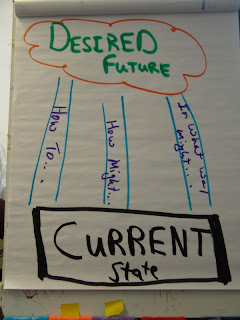have you responded to my question of a few blogs ago:
"What makes a mooc open? merely that it is open to anyone for participation? or that it is open learning to be networked, mixed, remixed and redistributed? that the content is purely creative commons material free to be reused in any manner that is not commercial? or, that it is free for any and everyone who wish to participate? or is it open for any interpretation one desires? If one has to sign an agreement not to distribute any personal learning materials or, the educational facility claims to "own" everything produced by learners or faculty ... is that open?"
Yup, I provided no answers, only bigger questions, hoping some would take the challenge and respond. Alas, it was not to be, and so ...
Once again, I have dipped into my participant role in the concurrent cMOOC, # etmooc, to bring you news. I am happy to share, with a caveat ... please spend some time wandering in this resource; then, go back to Creativity and Multicultural Communication, the website, and review some of the weekly materials to get a sense of how and where they fit in the scheme of "open". Then, review the 2008 Stephen Downes slideshare included in the resources listed under the open education section. Give some thought to what open might mean to creative thinking, connectivist learning and your PLN.
What do you think open means to you now? Please contribute to our collective learning via any means you wish ... a recording, a written blog, a video, starting a discussion with your thoughts ...
be creative and throw caution to the winds so we can build upon your ideas and reshape the meaning of learning to learning in an open environment. What does this mean for you? for teachers? for schools? for education as we have known it? for the future? and how will this relate to jobs, careers and life goals?
OK, here is the resource:
https://openeducationalresources.pbworks.com/w/page/24836480/Home
and you are now on the clock to come up with something(s) in the next 3 days. Have some fun with this! :)
"What makes a mooc open? merely that it is open to anyone for participation? or that it is open learning to be networked, mixed, remixed and redistributed? that the content is purely creative commons material free to be reused in any manner that is not commercial? or, that it is free for any and everyone who wish to participate? or is it open for any interpretation one desires? If one has to sign an agreement not to distribute any personal learning materials or, the educational facility claims to "own" everything produced by learners or faculty ... is that open?"
Yup, I provided no answers, only bigger questions, hoping some would take the challenge and respond. Alas, it was not to be, and so ...
Once again, I have dipped into my participant role in the concurrent cMOOC, # etmooc, to bring you news. I am happy to share, with a caveat ... please spend some time wandering in this resource; then, go back to Creativity and Multicultural Communication, the website, and review some of the weekly materials to get a sense of how and where they fit in the scheme of "open". Then, review the 2008 Stephen Downes slideshare included in the resources listed under the open education section. Give some thought to what open might mean to creative thinking, connectivist learning and your PLN.
What do you think open means to you now? Please contribute to our collective learning via any means you wish ... a recording, a written blog, a video, starting a discussion with your thoughts ...
be creative and throw caution to the winds so we can build upon your ideas and reshape the meaning of learning to learning in an open environment. What does this mean for you? for teachers? for schools? for education as we have known it? for the future? and how will this relate to jobs, careers and life goals?
OK, here is the resource:
https://openeducationalresources.pbworks.com/w/page/24836480/Home
and you are now on the clock to come up with something(s) in the next 3 days. Have some fun with this! :)


